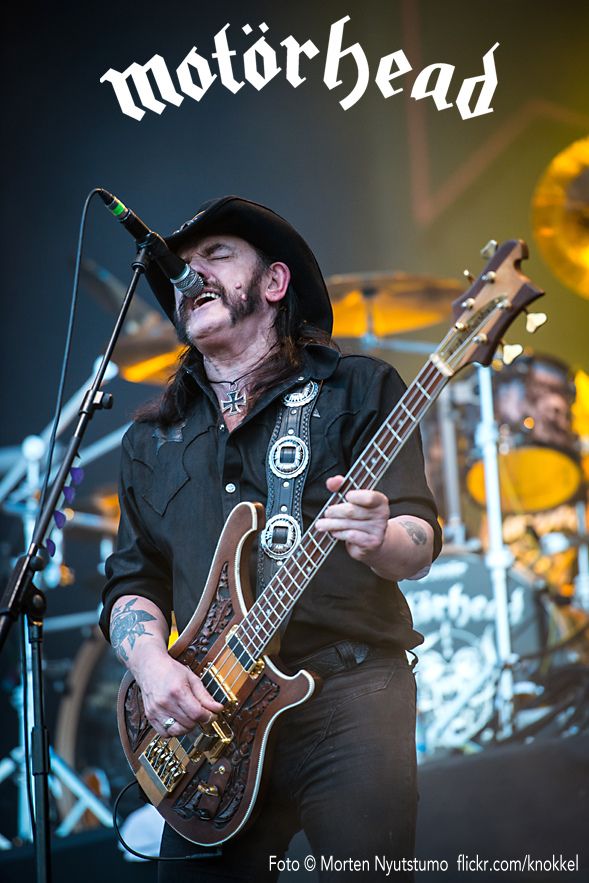The Metal God: Lemmy Kilmister’s Historical Legacy Will Echo in Motörhead’s Thunder for Eternity
Lemmy Kilmister was more than a frontman — he was the living embodiment of rock’s raw defiance. His gravel voice, thunderous bass, and no-compromise spirit forged Motörhead into an unstoppable force. Decades later, his legacy rumbles on every stage, roars through every amp, and rattles the bones of every fan who raises their horns skyward. In the roar of Motörhead, Lemmy lives forever.
They say that somewhere on the road, between the roar of a Harley and the squeal of an amp warming up, Lemmy’s ghost lingers. It’s not the haunting kind of ghost — no cold breeze, no flickering lights. Lemmy’s ghost comes in the form of a growl in the throat of a kid with a battered bass, of a bottle of Jack shared among strangers, of a roadie telling a story that begins with, “When Lemmy was here…”
Long after the man himself was scattered in a blaze of whisky-soaked toasts and thunderous tribute gigs, he’s still out there, hitching rides with truckers and young bands with dreams bigger than their van’s gas tank. Somewhere, there’s always a backroom where a twenty-something with a denim vest covered in patches is telling the wide-eyed tale of the first time they heard Ace of Spades blasting from their dad’s record player — how it didn’t just shake the windows but rewired their spine.
There’s a legend — maybe true, maybe not — that Lemmy never really left the Rainbow Bar & Grill on Sunset Strip. The story goes that he refused to go gently into that good night, so he struck a deal with the cosmos: Leave me my stool and my slot machine, and I’ll keep the rock ‘n’ roll fires burning from the other side. And if you wander into that corner of the bar on a quiet Wednesday night, when the jukebox is between songs and the neon flickers just right, you might catch a glimpse of an old cowboy hat and hear a gravel laugh echo above the clink of glasses.
Those who knew him best will tell you Lemmy was never about the fame — though he wore it like a battered leather jacket. He was about the song. The riff. The raw punch of an honest chord played too loud for polite company. He hated pretension, loathed posers, and would have no patience for anyone who thought rock should come with rules. For him, the rules were simple: Play loud, live true, don’t take any shit.
When Motörhead hit the stage, it wasn’t a concert — it was an assault. A three-man tank rolling through your ears and into your bloodstream, leaving behind ringing eardrums and a grin that lasted a week. Lemmy, with his bass slung low and mic tilted high, howled into the rafters like a prophet for the damned and the free. He didn’t sing at you — he dared you to come closer, to stand shoulder to shoulder with the outcasts, the outlaws, the lovers of the loud.
Long after the amps have cooled, his legend refuses to fade. In the sticky corners of grimy bars in cities you’ve never heard of, bands still plug in and bark out Overkill to crowds of fifty or five hundred. Tattoos of the Snaggletooth logo — that snarling, tusked beast — keep showing up on biceps, necks, even the sides of necks. It’s not fashion. It’s a vow. A mark that says, I belong to the church of Lemmy, and I will not be saved.
Every now and then, a kid — maybe a girl who found her dad’s old Motörhead vinyl, maybe a boy who stumbled onto a grainy YouTube clip of Lemmy barking at some TV host — picks up a bass. And maybe they can’t afford lessons. Maybe they’ll never master the fancy stuff. But they learn the way Lemmy did — plug in, turn it up, and smash it until it sounds right. If you can feel it in your bones, that’s all that matters.
Somewhere in this world — in a basement, a garage, a battered practice room that smells of stale beer and sweat — the next Motörhead is always tuning up. It doesn’t have to be called Motörhead. It doesn’t have to wear the name. But if it’s loud, if it’s raw, if it’s honest — Lemmy’s there. Every power chord struck with a clenched fist, every lyric barked into a cheap mic — that’s Lemmy’s ghost, smiling behind mirrored aviators, nodding approval.
They’ll tell you he was rough around the edges — true. He could be stubborn, foul-mouthed, impossible — true. But underneath the grime and growl was a heart that beat for music, for the misfits, for the kids who never fit in at school but found a home in a pit of denim and leather. He had time for fans, real fans — the ones who knew the lyrics, who stayed after the show, who’d buy him a drink just to hear a story about the days when rock was lawless and glorious.
After he died, the stories multiplied. Some say they see him on stage — a flicker of movement behind the drummer. Some swear they feel a hand on their shoulder in the middle of a solo, steadying them when the nerves hit. Some believe, in the roar of the crowd, when everyone chants Lem-my! Lem-my! Lem-my!, he’s right there in the thrum of the bass.
And maybe they’re right. Because if ever a man deserved to be more than a name on a tombstone, it’s the one who promised us he’d live fast and die old — and then did exactly that, on his own terms. The slot machine next to his favorite stool at the Rainbow still stands, glass polished clean, untouched by time. A shrine for the faithful who slip in a coin and hope maybe, just maybe, they’ll hit a jackpot and buy a round in his name.
You see, immortality isn’t found in marble statues or dusty museums. It lives in every bar that rattles its windows with Motörhead at closing time. It burns in the roar of a Harley taking the long way home at dawn. It lingers in the echo of a bass that’s too loud for its own good, driven by someone who remembers what Lemmy said: If you think you’re too old to rock ‘n’ roll, then you probably are.
There’s a young band tonight, in some nowhere town. They’re playing their first gig to a half-empty dive where the beer is flat, and the owner’s already grumbling about the noise. They don’t care. They plug in, take a breath, and before they hit their first chord, the singer looks at the bassist and says, “For Lemmy.” And they smash into Bomber, or maybe Killed by Death, or maybe some new beast of a song that Lemmy would’ve loved because it’s reckless, loud, and gives no apology.
In that moment, the Metal God is there. Not as a ghost chained to memories but as the beating pulse that keeps rock honest. He’s in the sweat dripping from the ceiling. He’s in the squeal of feedback. He’s in every heart that races a little faster because of the noise.
Someday, they’ll find that old photo — Lemmy, sunglasses on, mic jammed up high, bass hanging low like a cannon. They’ll see the grin that says, Don’t follow the rules, make your own. They’ll understand that rock ‘n’ roll was never about money or charts or radio hits — it was about the moments that can’t be explained to anyone who wasn’t there.
So next time you find yourself standing in front of a stage, beer in hand, heartbeat rattling your ribs, take a second. Raise your glass high. Look around at the misfits, the lifers, the ones who came to feel alive for a few loud hours. Remember Lemmy Kilmister — the Metal God, the immortal outlaw who didn’t just play rock ‘n’ roll. He was rock ‘n’ roll.
And when the lights go down and the band tears into that first riff, know this: Lemmy’s thunder isn’t gone. It never will be. As long as someone dares to turn it up to eleven and sneer at the silence, as long as there are kids ready to chase the noise, the Motorhead will keep roaring down the endless highway of eternity.
And somewhere out there — stool by the slot machine, glass in hand — Lemmy’s nodding along, forever louder than hell.
Read more visit. Sportonyou.com









